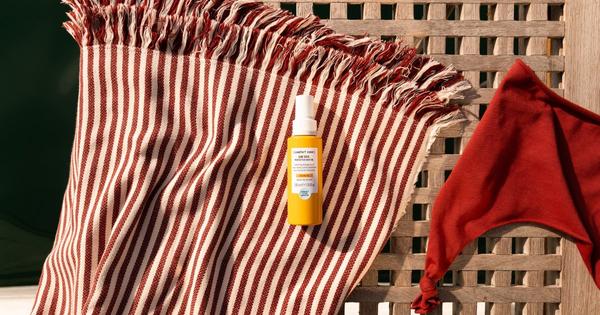Sun Soul Hydraglow After Sun
Shimmering soothing cream
skin care
Eve Mérinville | Corporate RD Excellence & SC RD and Innovation Director
10 min read

The familiar phrase, “Protect your skin from the sun,” is more than just a good piece of advice—it is essential for maintaining healthy, glowing skin. Let’s take a closer look at what, when, how, and why of incorporating sunscreen into our skincare regimen.
Using sunscreen daily is a must, regardless of whether you are outside or not. It is a powerful shield against the sun's harmful ultraviolet (UV) rays, known to cause long-term skin concerns. Although you may recognize the importance of sunscreen, understanding the deeper implications and knowing when and how to apply it can make all the difference in safeguarding your skin’s health.
Sunscreen, also known as sunblock or sun cream, is a topical product that helps protect the skin from the sun's UV radiation. With active ingredients like titanium dioxide, zinc oxide, and avobenzone, sunscreen acts as a protective barrier that absorbs or reflects UV rays, preventing them from penetrating the skin. While sunscreen does help the skin with premature aging, it also plays a critical role in protecting our skin from cancer and other environmental factors.
Prolonged exposure to UV rays can lead to sunburn, skin aging, pigmentation concerns, and an increased risk of skin cancer. Broad spectrum options, like SPF 30 or SPF 50, provide varying degrees of protection against UV, UVA, and UVB rays. Whether it is a beach day or a daily commute to work, applying sunscreen helps to maintain healthy, protected skin.
There are two primary types of sunscreen: chemical sunscreen and physical sunscreen.
| chemical sunscreens | physical sunscreens | |
| Chemical sunscreens work by absorbing UV rays | physical sunscreens create a protective layer on the skin's surface, reflecting UV rays away from the skin. |
Understanding the optimal timing for sunscreen application is key to ensuring that our skin remains protected throughout the day.
The best time to apply sunscreen is approximately 30 minutes before sun exposure. This allows the product to fully absorb into the skin in order to provide maximum protection. An easy way to ensure you are applying daily, before sun exposure, is to incorporate a product with sunscreen in it into your morning skincare routine.
To remain protected, reapply sunscreen every two hours, especially if you are spending an extended period outdoors, regardless of the season or cloud cover.
While the idea that applying sunscreen when staying indoors may come across as senseless, it is actually just as necessary. You might assume that your skin is shielded, however, UV rays can actually penetrate windows and cause skin damage.
While using sunscreen is a fundamental step in protecting your skin from the sun's harmful UV rays, applying it correctly is equally essential to ensure maximum effectiveness.
Before applying sunscreen, cleanse and moisturize your skin to ensure the product adheres properly.
As a rule of thumb, most adults need about an ounce or a shot glass worth of sunscreen to cover their entire body adequately.
It is important to apply sunscreen evenly on all exposed areas of the body, using gentle circular motions to guarantee full coverage.
As you go about your day, reapply your sunscreen every two hours, or after swimming or sweating, as water and friction can reduce its effectiveness.
You don’t have to skip makeup just because you want to protect your skin. Sunscreen can be seamlessly applied under makeup, ensuring you are protected throughout the day.

Selecting the right sunscreen for your skin is a crucial step in ensuring optimal sun protection and maintaining your skin's health. However, it is important to understand the differences so you make an informed decision for your specific skin needs.
First, assess your skin type. Those with oily skin may prefer oil-free or gel-based sunscreens, while those with dry skin may benefit from moisturizing formulas.
Sensitive skin requires extra care. For those who have skin that easily reacts, opt for a sunscreen labeled as “hypoallergenic” or “fragrance-free.”
If you have acne-prone skin, lean towards non-comedogenic sunscreens. These sunscreens are designed so that they won’t clog pores or cause breakouts.
For those with maturing skin, look for sunscreens with added antioxidants and anti-aging ingredients.
Choose reef-safe sunscreens to protect your skin from UV radiation while also protecting the ocean’s delicate ecosystems. These sunscreens avoid toxic chemicals that can be harmful to marine life.
Ensuring the compatibility of sunscreen with your other skincare products is crucial for maintaining the effectiveness of both your skincare routine and sun protection. When incorporating a sunscreen into your skincare routine, consider the following:
Sunscreen should be the last step in your skincare routine but applied before makeup. Make sure your other products like serums and moisturizers have had time to absorb into the skin before layering on sunscreen. This will ensure the effectiveness of all products.
There are two options here: You can use a moisturizer with built-in sunscreen or apply your moisturizer before sunscreen. Applying sunscreen after moisturizer ensures that both products can fully deliver their benefits.
For maximum efficacy, allow your serum(s) to absorb fully before applying your sunscreen.
If you are using harsh exfoliants on the same day you apply sunscreen, consider applying them in your evening routine rather than morning. This will help prevent any skin sensitivity that may be caused by the exfoliant.
Every time you go outside, your skin is exposed to harmful UV rays, making it all the more important to incorporate sunscreen into your daily skincare routine. Using sunscreen consistently will protect the skin, reduce the risk of skin cancer, and even mitigate the signs of aging.
Remember, protecting your skin is an act of love for yourself. Explore the Comfort Zone products to create a solid foundation for healthy, radiant skin.

Shimmering soothing cream
Anti-aging soothing moisturizing face and body cream
anti-aging sun cream